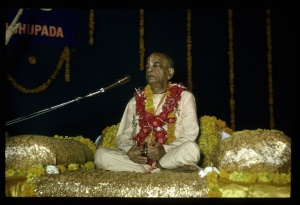CC Antya 6.237 (1975): Difference between revisions
(Vanibot #0027: CCMirror - Mirror CC's 1996 edition to form a basis for 1975) |
(Vanibot #0020: VersionCompareLinker - added a link to the Version Compare feature) |
||
| Line 2: | Line 2: | ||
<div style="float:left">'''[[Sri Caitanya-caritamrta (1975)|Śrī Caitanya-caritāmṛta (1975)]] - [[CC Antya (1975)|Antya-līlā]] - [[CC Antya 6 (1975)|Chapter 6: The Meeting of Śrī Caitanya Mahāprabhu and Raghunatha dasa Gosvāmī]]'''</div> | <div style="float:left">'''[[Sri Caitanya-caritamrta (1975)|Śrī Caitanya-caritāmṛta (1975)]] - [[CC Antya (1975)|Antya-līlā]] - [[CC Antya 6 (1975)|Chapter 6: The Meeting of Śrī Caitanya Mahāprabhu and Raghunatha dasa Gosvāmī]]'''</div> | ||
<div style="float:right">[[File:Go-previous.png|link=CC Antya 6.236 (1975)|Antya-līlā 6.236]] '''[[CC Antya 6.236 (1975)|Antya-līlā 6.236]] - [[CC Antya 6.238 (1975)|Antya-līlā 6.238]]''' [[File:Go-next.png|link=CC Antya 6.238 (1975)|Antya-līlā 6.238]]</div> | <div style="float:right">[[File:Go-previous.png|link=CC Antya 6.236 (1975)|Antya-līlā 6.236]] '''[[CC Antya 6.236 (1975)|Antya-līlā 6.236]] - [[CC Antya 6.238 (1975)|Antya-līlā 6.238]]''' [[File:Go-next.png|link=CC Antya 6.238 (1975)|Antya-līlā 6.238]]</div> | ||
{{CompareVersions|CC|Antya 6.237|CC 1975|CC 1996}} | |||
{{RandomImage}} | {{RandomImage}} | ||
==== TEXT 237 ==== | ==== TEXT 237 ==== | ||
<div class="verse"> | <div class="verse"> | ||
:amānī mānada hañā kṛṣṇa-nāma sadā | :amānī mānada hañā kṛṣṇa-nāma sadā la'be | ||
:vraje rādhā-kṛṣṇa-sevā mānase karibe | :vraje rādhā-kṛṣṇa-sevā mānase karibe | ||
</div> | </div> | ||
| Line 18: | Line 17: | ||
<div class="synonyms"> | <div class="synonyms"> | ||
amānī—not expecting any respect; māna-da—offering respect to others; hañā—becoming; kṛṣṇa-nāma—the holy name of the Lord; sadā—always; | amānī—not expecting any respect; māna-da—offering respect to others; hañā—becoming; kṛṣṇa-nāma—the holy name of the Lord; sadā—always; la'be—you should chant; vraje—in Vṛndāvana; rādhā-kṛṣṇa-sevā—service to Rādhā and Kṛṣṇa; mānase—within the mind; karibe—you should do. | ||
</div> | </div> | ||
| Line 25: | Line 24: | ||
<div class="translation"> | <div class="translation"> | ||
"Do not expect honor, but offer all respect to others. Always chant the holy name of Lord Kṛṣṇa, and within your mind render service to Rādhā and Kṛṣṇa in Vṛndāvana. | |||
</div> | </div> | ||
Latest revision as of 03:11, 27 January 2020

A.C. Bhaktivedanta Swami Prabhupada
TEXT 237
- amānī mānada hañā kṛṣṇa-nāma sadā la'be
- vraje rādhā-kṛṣṇa-sevā mānase karibe
SYNONYMS
amānī—not expecting any respect; māna-da—offering respect to others; hañā—becoming; kṛṣṇa-nāma—the holy name of the Lord; sadā—always; la'be—you should chant; vraje—in Vṛndāvana; rādhā-kṛṣṇa-sevā—service to Rādhā and Kṛṣṇa; mānase—within the mind; karibe—you should do.
TRANSLATION
"Do not expect honor, but offer all respect to others. Always chant the holy name of Lord Kṛṣṇa, and within your mind render service to Rādhā and Kṛṣṇa in Vṛndāvana.
PURPORT
Śrīla Bhaktivinoda Ṭhākura says in his Amṛta-pravāha-bhāṣya that when a man and woman are married, they beget children and are thus entangled in family life. Talk concerning such family life is called grāmya-kathā. A person in the renounced order never indulges in either hearing or talking about such subjects. He should not eat palatable dishes, since that is unfit for a person in the renounced order. He should show all respect to others, but should not expect respect for himself. In this way, one should chant the holy name of the Lord and think of how to serve Rādhā and Kṛṣṇa in Vṛndāvana.